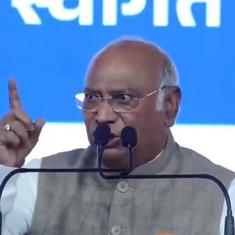Union Home Minister Amit Shah tried to rewrite Indian history in Parliament this week. During the debate over amendments to the law that governs the operations of the National Investigation Agency, which primarily investigates terror cases, Shah discussed two laws that have been scrapped: the Prevention of Terror Act and the Terrorist and Disruptive Activities Act.
“TADA was repealed. POTA was repealed. They were not repealed because of misuse,” Shah said. “Not once was POTA misused. They were repealed to save a vote bank... POTA was repealed by the UPA for vote bank and I pray that this House be not used for politics.” UPA here refers to the Congress-led United Progressive Alliance, the government that was in power when the POTA act was repealed in 2004.
Shah claimed that he was “setting the record straight”.
Except he was getting his own party’s history wrong. After all, there was so much clamour about the misuse of POTA by states using it to target communities and settle political scores that the Bharatiya Janata Party-led government at the term set up a review committee to ensure that the law was not being abused.
“There should be no misuse of POTA,” said former deputy Prime Minister LK Advani in 2003, warning states not to use it willy nilly, after two chief ministers wielded the law to take on their political rivals.
Dog whistling
This makes it clear that Shah’s actual aims in claiming there was no misuse is just another reiteration of the dog-whistling that his party has perfected. The Home Minister was arguing that the Congress-led government had intended to protect Muslims – who were disproportionately targeted by POTA. By extension, Shah was suggesting that speaking up for minority rights was the same as protecting terror.
This is not only wrong, it is also disturbing.
POTA was a deeply problematic law. It was passed soon after the September 11 attacks in New York and the December 2011 attack on Parliament in New Delhi, and fit into a trend at the time of executive overreach around the world in the guise of fighting terror. It gave government agencies expansive powers to link nearly anybody to a terror case, to detain them for an inordinate amount of time, to infringe on civil liberties and carry out legal proceedings with no transparency.
Its repeal was a positive event from a human rights perspective.
Terror laws
But Shah isn’t bothered about this. Instead, he wants to reiterate the fiction that the Congress-led government’s decision to repeal POTA was done to protect a “vote bank”. This narrative reinforces the idea that speaking up for minorities is somehow equivalent to defending terror, while ignoring genuine concerns about executive overreach and laws that violate human rights.
Many such provisions remain on India’s books, including the Unlawful Activities Prevention Act, which took many of its cues directly from POTA and was passed by the same Congress-led government that Shah is accusing of having carried out vote-bank politics. Shah’s own government has happily used these laws and others like the Public Safety Act and the National Security Act in questionable ways, while pursuing a public campaign against anyone who dares to dissent – as was made clear in the Bhima Koregaon case.
Authoritarian forces have always used crime prevention as an excuse to target specific communities and trample human rights. Anyone who disagrees with them is considered an enemy.
The BJP, under Shah and Prime Minister Narendra Modi have closely followed this playbook. But they should not be allowed to do so unchallenged. That is why it bears repeating: dissent is crucial for a democracy, and the defence of human rights ought to take precedence over an executive that, in the name of fighting terror, would always prefer to appropriate as much power without scrutiny as possible.
Also read:
From Pune to Paris: How a police investigation turned a Dalit meeting into a Maoist plot
Watch: A chilling view of all that has happened under the Unlawful Activities (Prevention) Act










